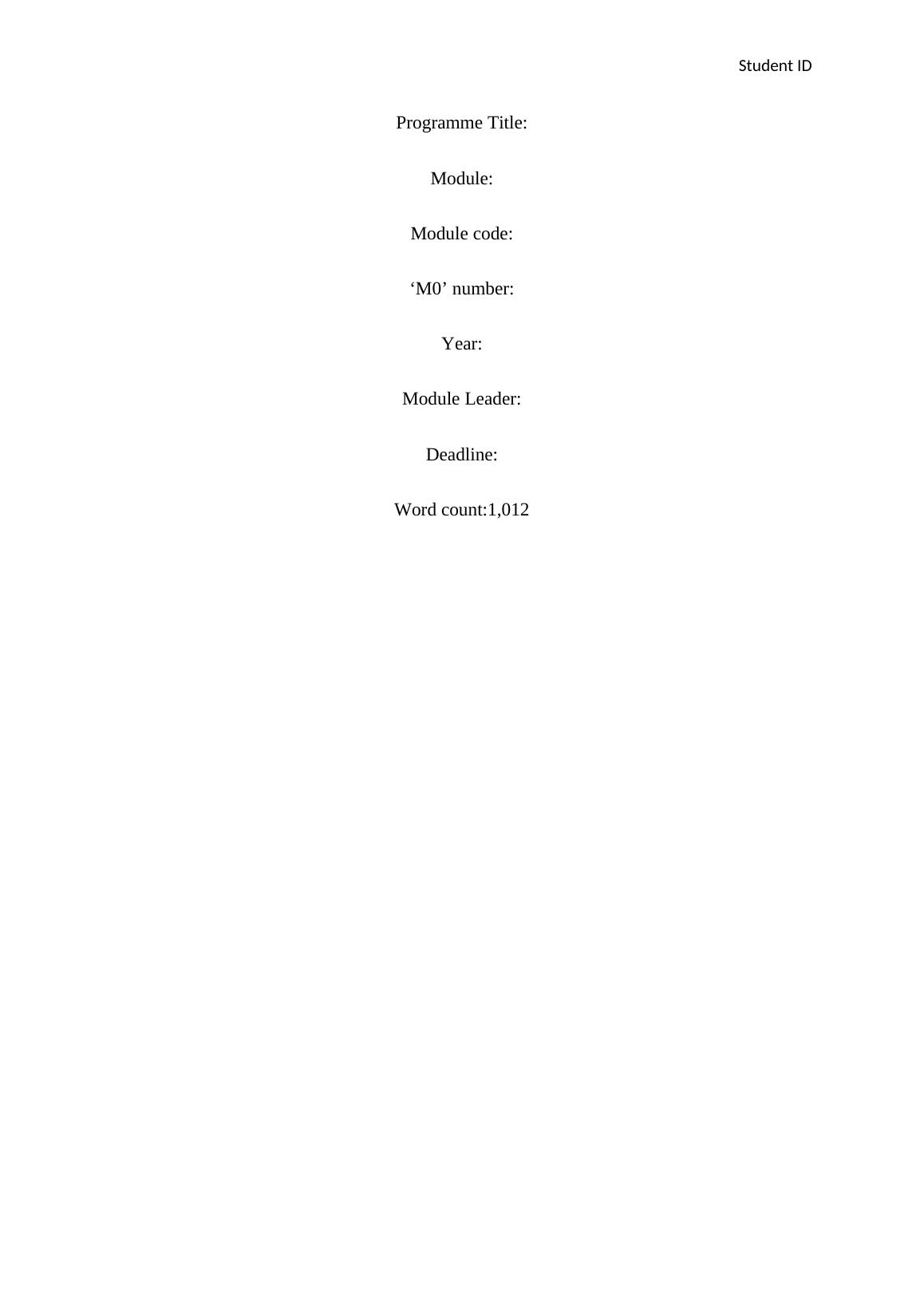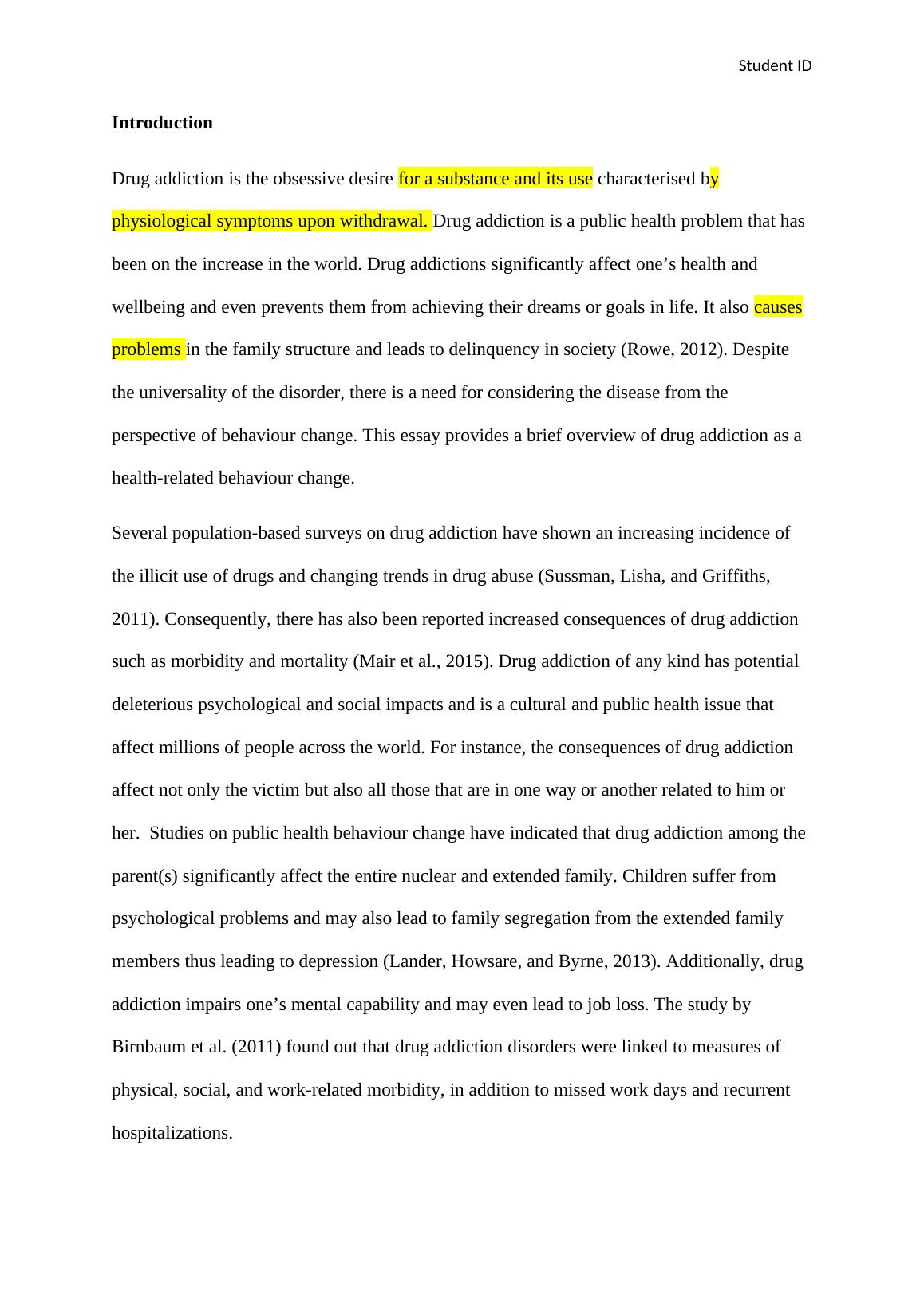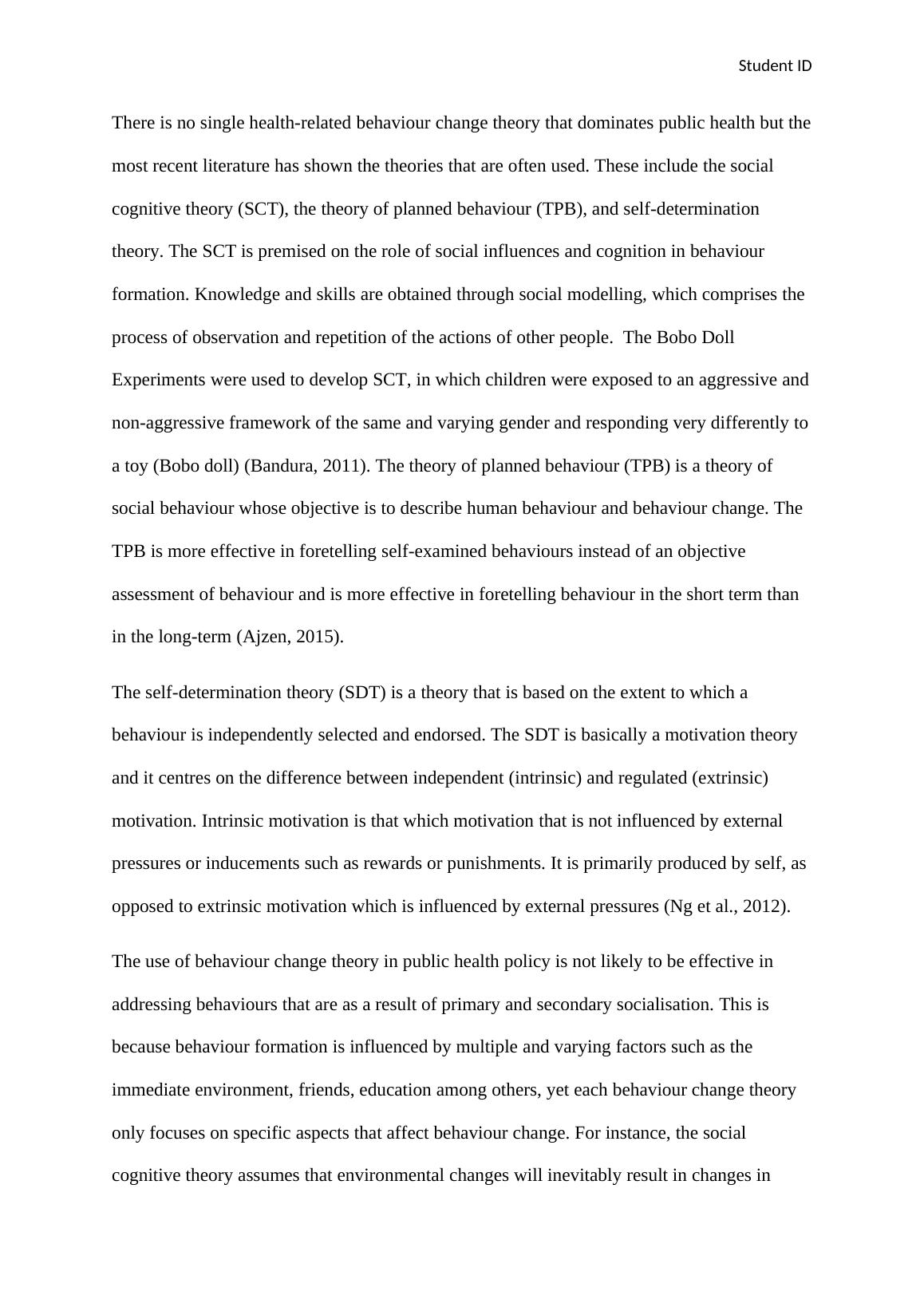Drug Addiction as a Health-Related Behaviour Change
Added on 2023-01-13
6 Pages1542 Words36 Views
Student ID
Programme Title:
Module:
Module code:
‘M0’ number:
Year:
Module Leader:
Deadline:
Word count:1,012
Programme Title:
Module:
Module code:
‘M0’ number:
Year:
Module Leader:
Deadline:
Word count:1,012

Student ID
Introduction
Drug addiction is the obsessive desire for a substance and its use characterised by
physiological symptoms upon withdrawal. Drug addiction is a public health problem that has
been on the increase in the world. Drug addictions significantly affect one’s health and
wellbeing and even prevents them from achieving their dreams or goals in life. It also causes
problems in the family structure and leads to delinquency in society (Rowe, 2012). Despite
the universality of the disorder, there is a need for considering the disease from the
perspective of behaviour change. This essay provides a brief overview of drug addiction as a
health-related behaviour change.
Several population-based surveys on drug addiction have shown an increasing incidence of
the illicit use of drugs and changing trends in drug abuse (Sussman, Lisha, and Griffiths,
2011). Consequently, there has also been reported increased consequences of drug addiction
such as morbidity and mortality (Mair et al., 2015). Drug addiction of any kind has potential
deleterious psychological and social impacts and is a cultural and public health issue that
affect millions of people across the world. For instance, the consequences of drug addiction
affect not only the victim but also all those that are in one way or another related to him or
her. Studies on public health behaviour change have indicated that drug addiction among the
parent(s) significantly affect the entire nuclear and extended family. Children suffer from
psychological problems and may also lead to family segregation from the extended family
members thus leading to depression (Lander, Howsare, and Byrne, 2013). Additionally, drug
addiction impairs one’s mental capability and may even lead to job loss. The study by
Birnbaum et al. (2011) found out that drug addiction disorders were linked to measures of
physical, social, and work-related morbidity, in addition to missed work days and recurrent
hospitalizations.
Introduction
Drug addiction is the obsessive desire for a substance and its use characterised by
physiological symptoms upon withdrawal. Drug addiction is a public health problem that has
been on the increase in the world. Drug addictions significantly affect one’s health and
wellbeing and even prevents them from achieving their dreams or goals in life. It also causes
problems in the family structure and leads to delinquency in society (Rowe, 2012). Despite
the universality of the disorder, there is a need for considering the disease from the
perspective of behaviour change. This essay provides a brief overview of drug addiction as a
health-related behaviour change.
Several population-based surveys on drug addiction have shown an increasing incidence of
the illicit use of drugs and changing trends in drug abuse (Sussman, Lisha, and Griffiths,
2011). Consequently, there has also been reported increased consequences of drug addiction
such as morbidity and mortality (Mair et al., 2015). Drug addiction of any kind has potential
deleterious psychological and social impacts and is a cultural and public health issue that
affect millions of people across the world. For instance, the consequences of drug addiction
affect not only the victim but also all those that are in one way or another related to him or
her. Studies on public health behaviour change have indicated that drug addiction among the
parent(s) significantly affect the entire nuclear and extended family. Children suffer from
psychological problems and may also lead to family segregation from the extended family
members thus leading to depression (Lander, Howsare, and Byrne, 2013). Additionally, drug
addiction impairs one’s mental capability and may even lead to job loss. The study by
Birnbaum et al. (2011) found out that drug addiction disorders were linked to measures of
physical, social, and work-related morbidity, in addition to missed work days and recurrent
hospitalizations.

Student ID
There is no single health-related behaviour change theory that dominates public health but the
most recent literature has shown the theories that are often used. These include the social
cognitive theory (SCT), the theory of planned behaviour (TPB), and self-determination
theory. The SCT is premised on the role of social influences and cognition in behaviour
formation. Knowledge and skills are obtained through social modelling, which comprises the
process of observation and repetition of the actions of other people. The Bobo Doll
Experiments were used to develop SCT, in which children were exposed to an aggressive and
non-aggressive framework of the same and varying gender and responding very differently to
a toy (Bobo doll) (Bandura, 2011). The theory of planned behaviour (TPB) is a theory of
social behaviour whose objective is to describe human behaviour and behaviour change. The
TPB is more effective in foretelling self-examined behaviours instead of an objective
assessment of behaviour and is more effective in foretelling behaviour in the short term than
in the long-term (Ajzen, 2015).
The self-determination theory (SDT) is a theory that is based on the extent to which a
behaviour is independently selected and endorsed. The SDT is basically a motivation theory
and it centres on the difference between independent (intrinsic) and regulated (extrinsic)
motivation. Intrinsic motivation is that which motivation that is not influenced by external
pressures or inducements such as rewards or punishments. It is primarily produced by self, as
opposed to extrinsic motivation which is influenced by external pressures (Ng et al., 2012).
The use of behaviour change theory in public health policy is not likely to be effective in
addressing behaviours that are as a result of primary and secondary socialisation. This is
because behaviour formation is influenced by multiple and varying factors such as the
immediate environment, friends, education among others, yet each behaviour change theory
only focuses on specific aspects that affect behaviour change. For instance, the social
cognitive theory assumes that environmental changes will inevitably result in changes in
There is no single health-related behaviour change theory that dominates public health but the
most recent literature has shown the theories that are often used. These include the social
cognitive theory (SCT), the theory of planned behaviour (TPB), and self-determination
theory. The SCT is premised on the role of social influences and cognition in behaviour
formation. Knowledge and skills are obtained through social modelling, which comprises the
process of observation and repetition of the actions of other people. The Bobo Doll
Experiments were used to develop SCT, in which children were exposed to an aggressive and
non-aggressive framework of the same and varying gender and responding very differently to
a toy (Bobo doll) (Bandura, 2011). The theory of planned behaviour (TPB) is a theory of
social behaviour whose objective is to describe human behaviour and behaviour change. The
TPB is more effective in foretelling self-examined behaviours instead of an objective
assessment of behaviour and is more effective in foretelling behaviour in the short term than
in the long-term (Ajzen, 2015).
The self-determination theory (SDT) is a theory that is based on the extent to which a
behaviour is independently selected and endorsed. The SDT is basically a motivation theory
and it centres on the difference between independent (intrinsic) and regulated (extrinsic)
motivation. Intrinsic motivation is that which motivation that is not influenced by external
pressures or inducements such as rewards or punishments. It is primarily produced by self, as
opposed to extrinsic motivation which is influenced by external pressures (Ng et al., 2012).
The use of behaviour change theory in public health policy is not likely to be effective in
addressing behaviours that are as a result of primary and secondary socialisation. This is
because behaviour formation is influenced by multiple and varying factors such as the
immediate environment, friends, education among others, yet each behaviour change theory
only focuses on specific aspects that affect behaviour change. For instance, the social
cognitive theory assumes that environmental changes will inevitably result in changes in

End of preview
Want to access all the pages? Upload your documents or become a member.
Related Documents
Child Sexual Agression or Abuse: Immediate and Long-Term Impact on the Child and Their Familieslg...
|13
|3674
|118
Assignment On The Public Healthlg...
|3
|606
|21
Social Work Practice and Mental Health: Understanding Schizophrenialg...
|3
|663
|320
Cyberbullying Policy Brief - State of Victorialg...
|12
|2713
|192
Project Proposal on Creative Arts for Creative Mindslg...
|18
|4829
|36
